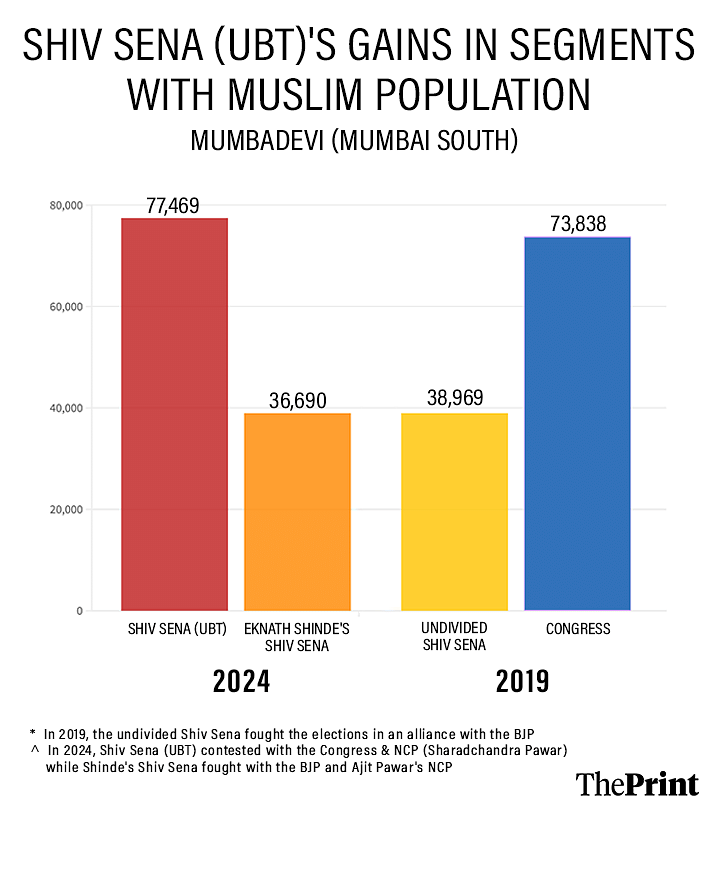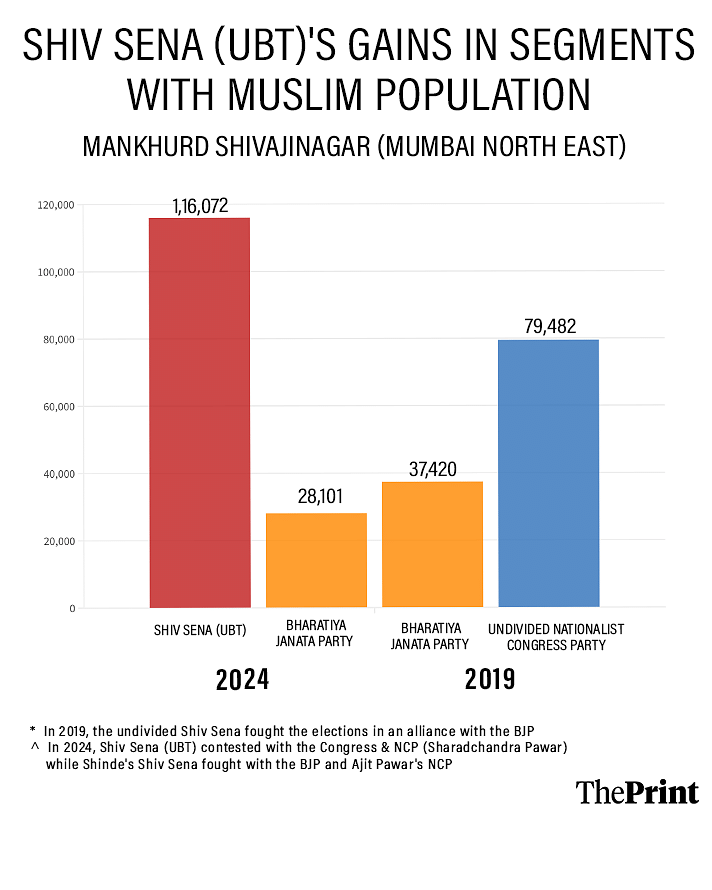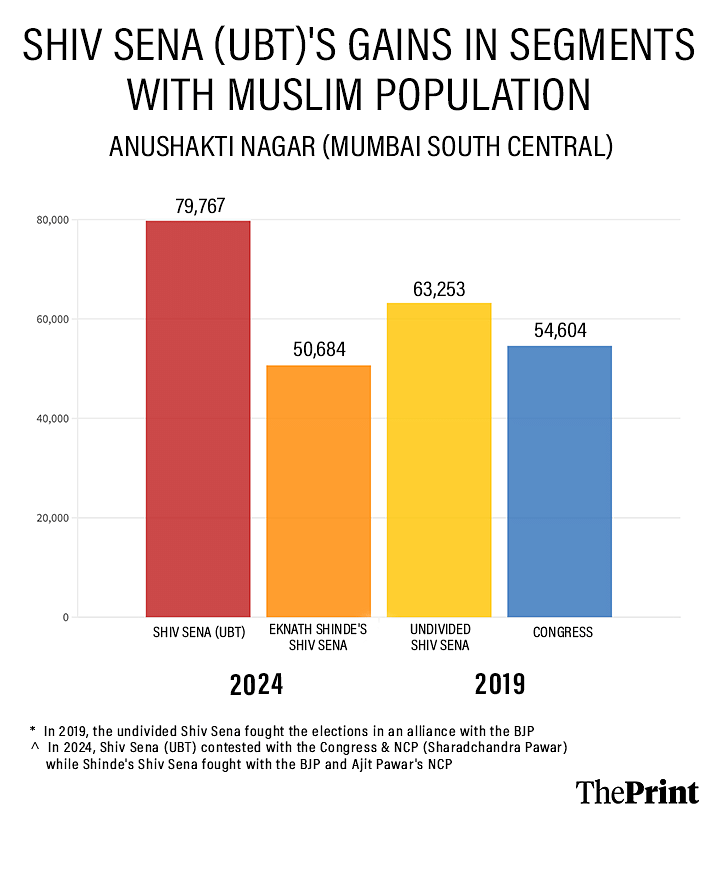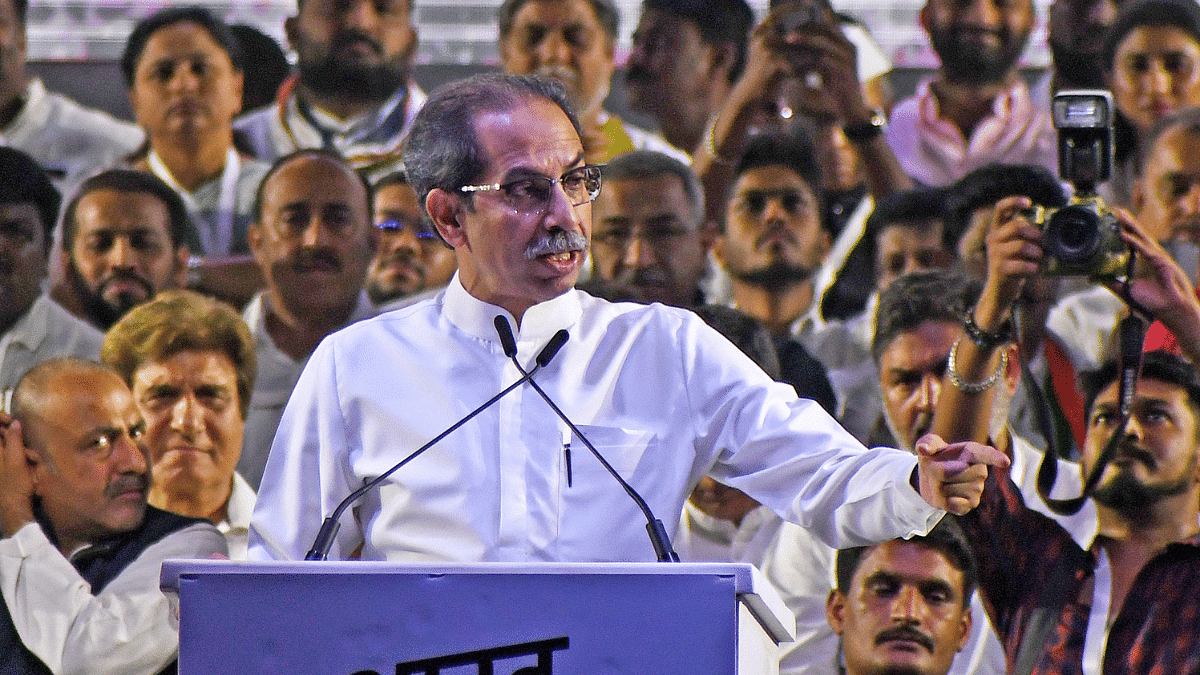In a departure from his usual style, Uddhav Thackeray spoke in Hindi, not Marathi, talking about how “there was a wall” between the Shiv Sena and the members of the settlement and campaigned on the prices of diesel, petrol and even garlic, before turning to the word that his father Bal Thackeray was the most associated with — Hindutva.
“We used to fight with each other. But now, I want to ask you something. Have I left Hindutva? Do you accept my Hindutva? Is there a difference between my Hindutva and the Bharatiya Janata Party’s (BJP’s) Hindutva?”
The answers from the crowd were “no” and “yes” respectively.
Cheeta camp voted for the Shiv Sena (Uddhav Balasaheb Thackeray) in large numbers, and so did many other Muslim-dominated pockets of Mumbai that had traditionally shunned Bal Thackeray’s Shiv Sena.
While some of these gains may be because of the Shiv Sena (UBT)’s alliance with the Congress, it is also a direct result of the party’s conscious social engineering efforts — an attempt to brand its Hindutva as an inclusive, nationalistic one, distinct from the BJP’s, to counter the party’s rise in its home turf of Mumbai and respond to the city’s changing demographics.
“Over the last few years, Uddhav Thackeray has been well aware of the changing demographics of Mumbai. Post-2014, the BJP’s presence had started increasing in Mumbai, and the party could capture the imagination of a certain section of middle-class voters. So, Uddhav Thackeray made a conscious effort of expanding his base to the backward classes, Dalits and Muslims in the city,” said Sanjay Patil, a researcher with the Mumbai university’s politics and civics department.
The party has also been trying to argue that this inclusive Hindutva of Uddhav Thackeray is no different from what his father espoused, even when it comes to Muslims.
Speaking with ThePrint, party leaders pointed out Bal Thackeray’s camaraderie with former Maharashtra CM A.R. Antulay, a Muslim, and his brief tie-up with the Muslim League in the 1970s when the Shiv Sena founder had even shared a stage with Muslim League leader G.M. Banatwala in Nagpada.
Meanwhile, the rival Eknath Shinde-led Shiv Sena has been slamming Uddhav Thackeray’s newfound support from Muslims as “vote bank politics” as emphatically as possible in rallies since the Lok Sabha election results, claiming that it is in complete contrast to the ideology of Bal Thackeray. The Shiv Sena split in June 2022, with both sides claiming to be the real legatees of Bal Thackeray’s ideology.
The Shiv Sena (UBT) won nine seats, while the Shinde-led Shiv Sena clinched seven. In Mumbai, the Shiv Sena (UBT) won three of the four seats it contested, while Shinde’s Shiv Sena got just one of the three it fought, that too by a wafer-thin margin of 48 votes. Mumbai has six parliamentary constituencies.
Also read: Thackeray, Shinde both claim Hindutva high ground at Sena foundation day rallies ahead of state polls
‘Balasaheb was nationalist, so are we’
Ravindra Mirlekar, a senior functionary of the Shiv Sena (UBT), recalled an incident from the 1992-93 riots when there was a rumour about the violence that was being planned at a Muslim cemetery at Mumbai’s Chira Bazar.
“All Muslims gathered there, and there were talks of how they were going to attack Hindus. The Shiv Sena and some other Hindu organisations met the Muslim crowd with equal aggression; the police also supported well. This aggressive Hindu, one who is not scared to retaliate against anyone threatening him, was created by Balasaheb Thackeray,” said Mirlekar.
But, he added, that did not conversely make him anti-Muslim.
The Shiv Sena was conceived as a nativist movement in June 1966, but by the 1980s, Bal Thackeray realised that the party needed more ideological ammunition to expand beyond Mumbai. That is why the Sena officially adopted Hindutva as an agenda at the party’s second adhiveshan (session), held at Mahad in the Konkan region in 1985, and the Vile Parle bypoll happened when Hindutva as a political agenda had become mainstream.
A fiery orator, writer and illustrator, Bal Thackeray, at the time, employed his abilities to highlight the Shiv Sena’s new-found Hindutva agenda with his speeches and columns, many of which had a tart anti-Muslim flavour.
The Srikrishna Commission, which probed the communal riots that ravaged Mumbai a few years later from December 1992 to January 1993, indicted Bal Thackeray and detailed the Shiv Sena’s role in inciting the violence. Some of the Muslim-majority areas that voted for the Shiv Sena (UBT) in this election were among the worst affected during the riots.
Shiv Sena (UBT) leaders argued that what happened in 1992-93 was a reaction of the party to certain “anti-national elements” within the Muslim community.
“When Pakistan won a cricket match, there would be celebratory fireworks in Bhendi Bazar. That was also when the Mumbai underworld was at its peak. It was Shiv Sena that put an end to all this,” said Ravindra Mirlekar, who was among the foot soldiers of the Shiv Sena in Mumbai at the time.
Mirlekar said that Bal Thackeray would react to all these issues in his usual “Thackeri language,” a term that Shiv Sainiks have coined to refer to their founder’s belligerent, satirical and sharp oratory style.
“Political rivals extrapolated that to create an image that Bal Thackeray was anti-Muslim when he was simply of the opinion that anyone doing seditious acts should be destroyed,” he said.
Also read: Sena (UBT) to move HC over Ravindra Waikar’s win in Mumbai North-West — why this tussle is persisting
Shiv Sena (UBT)’s Muslim gains
Overall, according to Election Commission data, Shiv Sena (UBT) got 49.12 percent of the 34.49 lakh votes cast in the four seats that the party contested in Mumbai, namely Mumbai South, Mumbai South Central, Mumbai North East and Mumbai North West. The party won the first three seats, with Mumbai South and Mumbai South Central having victory margins of more than 50,000.
According to assembly segment-wise data, the party did make gains in some of its traditional Marathi bastions. For instance, within Mumbai South, in Sewri, Shiv Sena (UBT)’s Arvind Sawant got 76,053 votes as against the Shinde-led Shiv Sena’s Yamini Jadhav who got 59,150 votes. In Mumbai North East’s Vikhroli assembly segment, Shiv Sena (UBT)’s Sanjay Dina Patil got 68,672 votes as against Bharatiya Janata Party’s (BJP) Mihir Kotecha who got 52,807 votes here.
However, in the undivided Shiv Sena’s home turf of Mumbai South Central’s Mahim assembly segment, which includes areas such as Dadar and Shivaji Park and is home to the Shiv Sena (UBT)’s headquarters of Shiv Sena Bhavan, the Shinde-led Shiv Sena’s Rahul Shewale took the lead with 69,488 votes as against Shiv Sena (UBT)’s Anil Desai who polled 55,498 votes. Desai triumphed in the seat in the overall results.
Another slight dent for the Shiv Sena (UBT) was the slim lead in the Mumbai South’s Worli assembly segment. A motley mix of affluent cosmopolitan population, Marathi middle-class households, and a fishing hamlet, Worli is represented by Thackeray scion Aaditya Thackeray. In that segment, the Shiv Sena (UBT) got 64,844 votes, just 6,715 more than the Shinde-led Shiv Sena.
Addressing a gathering of his faction of the Shiv Sena on the party’s foundation day Wednesday, Maharashtra Chief Minister Shinde mocked the meagre victory margin of the dynast, suggesting that he contest from Bhendi Bazaar instead for an assured win. Bhendi Bazaar is a Muslim-dominated neighbourhood in south Mumbai.
Shinde’s comment mayffor in have been quintessential political rhetoric, but it does point to a churn on the ground. Talking about a Muslim-majority constituency as a safe seat for the Shiv Sena, even if in jest, was bordering ludicrous until now. The Lok Sabha results, however, indicate that there’s been a definite shift in that notion.
For instance, in Mumbadevi, another Mumbai South assembly segment, represented by Congress’s Amin Patel for the past three terms, Shiv Sena (UBT) got 77,469 votes as against the Shinde-led Shiv Sena’s 36,690 votes.

In 2019, the undivided Shiv Sena got 38,969 votes there as against Congress’ Milind Deora’s 73,838. Deora left the Congress in January this year to join the Shinde-led Shiv Sena and is now a Rajya Sabha MP.
In Mumbai North East, Shiv Sena (UBT)’s Sanjay Dina Patil made big gains in the Mankhurd Shivajinagar assembly segment, getting 1,16,072 votes as against BJP’s Mihir Kotecha who got 28,101 votes.

In 2019, Sanjay Dina Patil, who was with the NCP, got 79,482 votes, while BJP’s Manoj Kotak got 37,420. The undivided Shiv Sena contested that election in an alliance with the BJP and did not have a candidate in the seat.
The Mankhurd-Shivajinagar assembly pocket, which has large swathes of slums with a sizeable Muslim population, has been represented at the state level by the Samajwadi Party’s Abu Azmi for the past three terms.
In Mumbai South Central, Anushakti Nagar, represented by the Nationalist Congress Party’s (NCP) Nawab Malik as an MLA before the undivided Shiv Sena defeated him in 2019, Shiv Sena (UBT)’s Anil Desai got 79,767 votes in the recently concluded election, while Shinde-led Shiv Sena’s incumbent Rahul Shewale got 50,684 votes. In 2019, undivided Shiv Sena’s Rahul Shewale got 63,253 votes against Congress’s Eknath Gaikwad’s 54,604.

Anushakti Nagar is a mixed neighbourhood that has a large Muslim slum settlement. A part of the Cheeta camp falls in this assembly segment.
All of these segments have a significant Scheduled Castes population, too.
A Mumbai-based BJP functionary who did not wish to be named said, “Purely in terms of poll arithmetic, Uddhav Thackeray’s social engineering of Marathi, Muslim and Dalit votes has turned out to be a formidable combination. We will have to think of how to counter it.”
Also read: Row after Shinde Sena MP’s kin booked for taking phone to counting centre, report says ‘linked to EVM’
Conscious social engineering
In 2017, Haroon Khan, who had been a member of the undivided Shiv Sena for more than 25 years, got a message from Uddhav Thackeray. Amboli, the ward he associated with, was declared as a women’s seat and the Shiv Sena chief, who was fighting his first Mumbai civic elections after his father Bal Thackeray’s death, wanted Khan to recommend a family member as the party’s official candidate.
Khan’s wife, Shahida, won the civic elections with a vote share of 31.75 percent and became one of the first two Muslim corporators of the pro-Marathi, pro-Hindutva party, within which, first, Bal Thackeray and, later, his son Uddhav has started almost every speech with the greeting — “Jamlelya majha tamam Hindu bhagininno, bandhavanno ani maatanno (All my Hindu sisters, brothers and mothers gathered here)”.
The other Shiv Sena Muslim corporator to get elected in 2017 was Haji Mohammed Halim Khan from Behrampada.
The Shiv Sena in that election fielded five Muslim candidates who had polled a vote share of nearly 20 percent across the five seats. The BJP, at the time, also fielded six Muslim candidates, but none of them won.
Khan said, “Uddhav ji Thackeray became more acceptable for Muslims after he broke the alliance with the BJP — first, in 2014, and then, more definitely, in 2019. Till then, Muslims always saw the Shiv Sena from the prism of the BJP’s hardline Hindutva.”
In 2014, the BJP and the undivided Shiv Sena parted ways to contest the assembly polls separately but came together after the elections to rule the state government as a coalition.
In 2019, it was the opposite. The parties contested the state polls as allies, but the alliance splintered after the results, paving the way for the formation of the Maha Vikas Aghadi (MVA) by the Thackeray-led Shiv Sena, the Congress and the Sharad Pawar-led Nationalist Congress Party (NCP).
“Moreover, when Uddhav ji became CM, the kind of decisions he took during the COVID pandemic, without looking at caste or religion….In the 2.5 years, there were no communal events in the state and no communally sensitive comments. All of that has boosted the confidence of the Muslim community in our party,” he added.
In 2018, Shiv Sena MLA Sunil Prabhu, with Shiv Sena (UBT) now, stumped many by supporting a demand for Muslim quota.
Speaking to ThePrint at the time, Prabhu said, “It was always Balasaheb Thackeray’s ideology to strive for justice for the poor and the oppressed and Uddhav saheb follows the same ideology. Instead of looking at this from the prism of samaj (community) and jaat (caste), it should be seen as the Shiv Sena voicing the demands of the people.”
The major turning point in the Uddhav Thackeray-led Shiv Sena’s outreach to Muslims and the community’s acceptance of the party came in 2019 when Thackeray walked out of his alliance with the BJP and became part of the MVA.
Within a month of swearing in as CM of the MVA government, Thackeray, speaking at the legislature’s winter session in Nagpur, said it was the party’s mistake to mix religion and politics.
Mumbai University’s Patil said, “From 2014 to 2019, it was a bit of a struggle for Uddhav Thackeray to decide his ideological stand. At that time, the BJP’s political ambitions and footprint were increasing in Maharashtra. The Shiv Sena couldn’t fully step out of the government yet. It was trying to figure out where its place in politics is to take on the BJP.”
“By this time, Narendra Modi was firmly in the position of the new ‘Hindu Hruday Samrat’ (a title informally associated with Bal Thackeray). Uddhav Thackeray couldn’t leave Hindutva altogether, so he reinvented his Hindutva to show how it’s different from the BJP’s to attract the anti-BJP votes while keeping his base intact in a changing demography. He tried to show how his Hindutva is more accommodative, inclusive, and one that talks about welfare and employment,” he said.
Party workers at the Mankhurd-Shivajinagar office of the Shiv Sena said in the 2.5 years that Uddhav Thackeray was CM, a lot of work got done in the Cheeta camp.
“We helped reduce water scarcity issues there. We extended a lot of help during the COVID-19 pandemic, in terms of food, helping people bury their dead, organising funerals, and shifting patients to the makeshift COVID hospitals set up. All that earned a lot of goodwill, and this time, people of the Cheeta camp came forward to demand that we organise a campaign rally of Uddhav saheb in their locality,” said Hrudaynath Tari, whose wife Rutuja was a corporator from the ward.
Kiran Sawant, the shakha pramukh at Mankhurd Shivajinagar, added, “Muslims don’t care about what happened in 1992-93 anymore. They care more about inflation and jobs and acknowledge how Uddhav saheb takes everyone along,” he added.
Curiously, as Uddhav Thackeray addressed party workers on the occasion of the Shiv Sena’s foundation day Wednesday — his first address to them since the Lok Sabha election results — he dropped the word ‘Hindu’ from his characteristic greeting and replaced it with “mard, ladhvaiyya, Shiv Sainik bandhavanno, bhagininno and matanno (macho, soldiers, Shiv Sainik brothers, sisters and mothers)”.
The omission may or may not have been deliberate, but in the race to stake a claim on Bal Thackeray’s legacy, his rival Shinde was watching with a hawk’s eye.
Addressing his faction’s cadre at a separate event to mark the Shiv Sena’s foundation day, Shinde said, “What is this compulsion? Even at a party function, Uddhav Thackeray cannot say Hindu brothers and sisters.”
(Edited by Madhurita Goswami)
Also read: Shinde camp veteran, ‘common’ Shiv Sainik who rose up ranks, Prataprao Jadhav takes oath as minister

